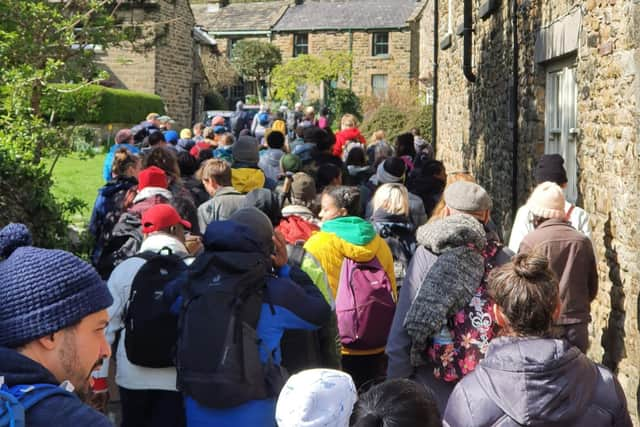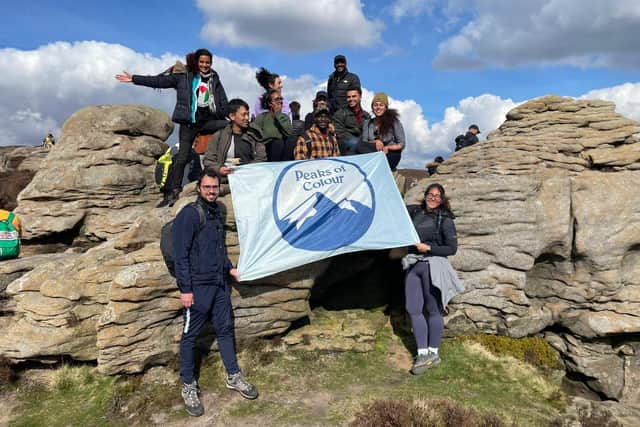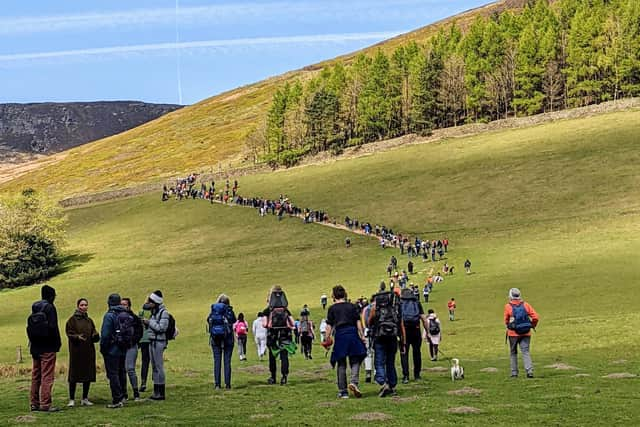Kinder in Colour event breaks down racial barriers on historic day for Peak District
and live on Freeview channel 276
Kinder in Colour on Sunday, April 24, was attended by individuals, groups and organisations from across the country, including Peaks of Colour, Wanderers of Colour and the Sheffield Environmental Movement (SEM).
SEM founder Maxwell Ayamba, a PhD student researching race ecology and environmental justice, said: “It was the first ever mass gathering of black people and people of colour in the history of rural Britain and we were overwhelmed by the turnout.
Advertisement
Hide AdAdvertisement
Hide Ad“Having people from all racial backgrounds coming together, celebrating and walking up Kinder in all their diversity was marvellous to see. It was a joyful moment I will remember forever.”


He added: “There were many white people who joined us too. It demonstrates the unity we need to widen the right to roam and ensure people from all walks of life have access to these spaces.
“Hikers were saying they had never stepped foot in this kind of place before. They came not knowing what to expect nor how welcome they would be. This opened a new chapter to their lives.”
Issues of rural inclusivity have become increasingly visible in recent years, with some estimates that black people and people of colour account for just one per cent of all visits to UK national parks.
Advertisement
Hide AdThe situation was encapsulated by an incident last year when a group of Muslim hikers received a torrent of racist online abuse for walking up Mam Tor on Christmas Day.


Advertisement
Hide AdThe Peak District park authority and other public agencies have launched a series of policy measures, met half-way by grassroots initiatives – but there is more to do.
Nadia Shah, one of the event’s organisers, said: “As a half-Pakistani, half-Geordie, turning up at the pub door after a long walk still fills me with hesitancy.
“Despite some progress in the past decade and the well-meaning efforts of outdoor initiatives, the countryside remains a white space. You are looked at differently and sometimes, unfortunately, you are treated differently too.”
Advertisement
Hide AdShe added: “The conservation sector, where I work, is the second least diverse sector in the country. The least is farming. The people who live in the countryside are overwhelmingly white. We want the countryside to become a more diverse, inclusive place.”


Barriers to access stretch well beyond the national park, and compound social and economic inequalities in more urban areas.
Advertisement
Hide AdA 2020 Ramblers Association report found just 39 per cent of people from a black, Asian or minority ethnic background lived within a five-minute walk of a green space, compared to 58 per cent of white people.
More than two-fifths of people from ethnic minorities live in England’s most green space-deprived neighbourhoods, compared with just one in five white people, according to data produced the same year by Friends of the Earth.
Advertisement
Hide AdMaxwell said: “If you look at the history of the mass trespass, in those days it was a class issue. Now there are more questions of race and privilege too.
“Firstly, those spaces are perceived to be racialised in whiteness by communities of colour. Secondly, it is wealthy people who have the greatest access – they have good jobs, time on their hands, can afford proper outdoor gear and cars to take them where public transport can’t.
He added: “Physical inactivity costs the NHS £1billion a year, and wider society £7bn. Air quality in the cities is a big problem and the impact of the pandemic has been greater among communities of colour because they lack access to outdoor spaces.
Advertisement
Hide Ad“The racialisation and commodification of the English countryside makes events like this so important to democratise the space.”
Advertisement
Hide AdAs well as the march, the day-long event featured speeches from activists, nature education sessions and ceremonies designed to reconnect people with the land, coordinated by campaign group Right to Roam, which advocates improved access to the countryside for everyone in Britain.
Spokesperson Sam Siva said: “The original Kinder trespass saw the children of Jews and migrants, Quakers and nonconformists hike from the margins of British society to strike at the privileged heart of its landowning elite.
“They were vilified as outsiders but their actions paved the way for rights of access now enjoyed by everyone in Britain. A diverse, inclusive countryside means more rights for everyone to connect with the land. Today, black people and people of colour gather to finish the job.
Sam added: “By connecting to nature, celebrating our rich cultures and dreams, we can create a new culture for the countryside – one which embraces change, knowledge exchange, biodiversity and difference."
Advertisement
Hide AdAdvertisement
Hide AdLast week, it emerged that the Government had quashed a review into the right to roam in England’s countryside. Defending a status quo in which legal restrictions already prevent people from walking freely across 92 per cent of the nation’s land, leader of the Commons Mark Spencer described the countryside as “a place of business.”
Maxwell said: “If you look at the 2019 Glover Review, it makes the point that we are all paying for these national landscapes through taxes but they still feel exclusive. Expanding the right to roam will help loads of people access these spaces.
“The new policing Bill is set to make trespass a criminal offence rather than a civil one, which will make people fear walking in places they don’t know and extend historic problems between the police and people of colour from cities into the countryside.”
He added: “The Peak District National Park is doing its best, some landowners actually want to open up footpaths and it is part of the Government’s own agenda to promote rural communities as equitable – but it the recommendations are not taken forward and there is no funding, then it will mean nothing.”
